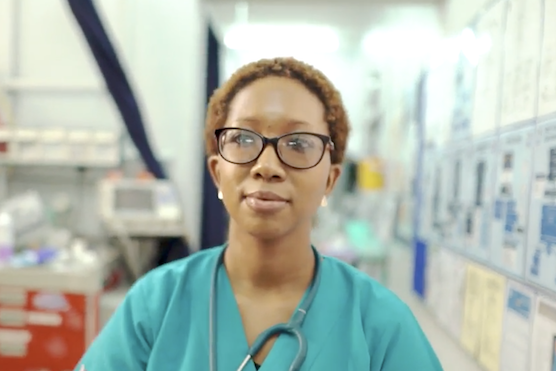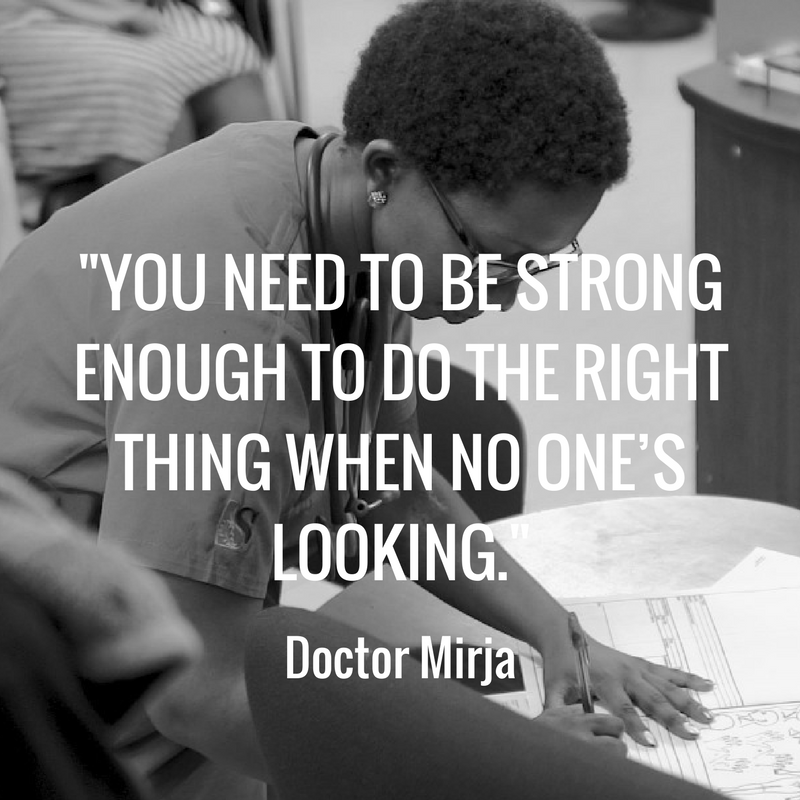NEWS
June 24, 2020

IN BRIEF
Dr Mirja Delport is a doctor at the Oudtshoorn District Hospital in South Africa. Since the outbreak of the coronavirus, she’s been on the frontlines, working day shifts at the hospital and then doing double duty at a community clinic near her home. In a webinar unpacking social accountability practice that was co-hosted by Accountability Lab and the World Bank, she shared how doing the right thing in an emergency response – often with very limited resources – and being famed for it was a powerful motivator for shifting behaviours and changing norms. Mirja was joined by three other dedicated [...]
SHARE
 Dr Mirja Delport is a doctor at the Oudtshoorn District Hospital in South Africa. Since the outbreak of the coronavirus, she’s been on the frontlines, working day shifts at the hospital and then doing double duty at a community clinic near her home. In a webinar unpacking social accountability practice that was co-hosted by Accountability Lab and the World Bank, she shared how doing the right thing in an emergency response – often with very limited resources – and being famed for it was a powerful motivator for shifting behaviours and changing norms.
Dr Mirja Delport is a doctor at the Oudtshoorn District Hospital in South Africa. Since the outbreak of the coronavirus, she’s been on the frontlines, working day shifts at the hospital and then doing double duty at a community clinic near her home. In a webinar unpacking social accountability practice that was co-hosted by Accountability Lab and the World Bank, she shared how doing the right thing in an emergency response – often with very limited resources – and being famed for it was a powerful motivator for shifting behaviours and changing norms.
Mirja was joined by three other dedicated icons in our global network – Sita Sharma from Nepal, and Rebecca Scotland and Jugbeh Kekula who are both from Liberia. Our Integrity Icon program works to lift public servants up and support a global coalition among them that pushes for positive solutions to integrity challenges. The webinar was a strong exercise in understanding why doing the right thing – and being famed for it – is a powerful motivator for shifting behaviors and changing norms.
Mirja’s personal experience of public healthcare challenges inspire her to ensure that patients are directed to the correct healthcare access points to facilitate timely treatment. “It seems a bit corny and cheesy, the fact that you make a difference, but the perspective helps when everything starts to get a bit overwhelming and you start questioning what you’re doing and asking whether people find value in what I’m doing besides getting their tablets. Is there some kind of positive thing besides just fetching a tablet and going away and being like, ‘Okay, I’ll just keep coming and doing this’. But actually you realise that patient had a big change in her life. She now knows her diagnosis. She now knows what’s going on with her and is now educated to the point that she’s taking ownership over her illness,” Mirja explains.
It’s evident that Mirja is more than passionate about her work. For her, integrity is following up on all her patients and ensuring that none of them slip through the cracks by doing the right thing simply because it is the right thing to do, without seeking praise or external validation.
“It was such a random thing and I saw it today – those small moments where you see that you’ve been their first call. So it’s not just exiting the system but that they are at a next level of care, seeing that your small intervention that you made in the beginning has actually made a vast change in their lives. So, that today for me, was petrol in my tank.” Furthermore, by modelling that kind of behaviour, she hopes to be a positive influence in other ‘s lives.
She adds that as a doctor, it’s difficult to do so in the public sector as there are many things she sees that she would like to do for the patients but is often constrained by the resources available.
“I always start by being honest with my patients. If I tell them we are going to do this or do that for them, I make sure I follow through when it’s done and they see that I’m still interested in them and I like to follow up about what’s going on. I try to keep my word to the patient and stick to the commitments I have made. I focus and show them that I am interested because often patients in the public system don’t trust us and feel like they are just one in a number – so I try to be present and focus,” she says. All public sector workers, she says, should strive towards going above and beyond the call of duty to make a positive change as a solid basis for integrity.
She adds that she’s usually the one who questions if the systems are working and brings up ideas to evaluate how to improve systems in her small town clinic and district hospital.
During the COVID-19 pandemic, the added stress and anxiety has also weighed heavily on her and her team’s shoulders. Being on the healthcare frontlines can be exhausting as doctors and nurses are trying to reach every patient’s needs without shelving their own. But she advises that doctors should not stretch themselves too thin.
“You can’t stretch yourself too thin and this is why I am honest with my patients about setting realistic goals with them.”
*Look out for the next blog in this series next week as we meet other icons from our network doing incredible, necessary work.
